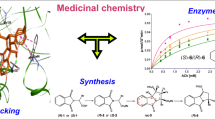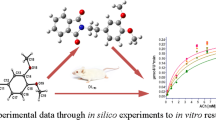Abstract
Alzheimer’s disease (AD), the most common form of dementia, is characterized by a progressive degeneration of the brain that leads to loss of memory and deterioration of others cognitive functions. The only drugs currently approved for treating AD are AChE inhibitors (AChEIs). We previously tested a novel isoindoline-1,3-dione, finding potent inhibition of AChE, in part because the two carbonyl groups of phthalimide facilitate hydrogen bonds with the enzyme. The aims of the present study were: (A) To achieve a faster and cheaper technique with a reduced quantity of reactive, without significant difference in the validation of the results, by modifying the version of the method described by Bonting and Featherstone. (B) To test new isoindolines and dioxoisoindolines as AChEIs and see if the carbonyl group is really important for affinity. Both families of compounds (isoindolines and dioxoisoindolines) had an inhibitory effect. The enzymatic inhibitions produced by isoindolines were uncompetitive, whereas that evoked by dioxoisoindolines were competitive. One of the isoindoline derivatives (IsoB with a Ki of 88–160µM) showed about 5-fold greater inhibition of AChE than its corresponding dioxoisoindoline. According to molecular docking performed, dioxoisoindolines apparently interact with the catalytic active site, the peripheral anionic site, and the aromatic patch, which can explain the kind of inhibition observed. Due to the uncompetitive inhibition of isoindolines, their inhibitory behavior could not be explored in silico. We afforded a faster and more efficient method, while yielding similar results than Bonting and Featherstone method. Additionally, we demonstrated that carbonyl group affects the kind of inhibition and the affinity.





Similar content being viewed by others
References
Achary R, Jung I-A, Son S-M, Lee H-K (2017) Stereoselective synthesis of functionalized 1,3-disubstituted isoindolines via Rh(III)-catalyzed tandem oxidative olefination-cyclization of 4-aryl-cyclic sulfamidate-5-carboxylates. J Org Chem. https://doi.org/10.1021/acs.joc.7b00799
Aliabadi A, Foroumadi A, Mohammadi-Farani A (2013) Synthesis and evaluation of anti-acetylcholinesterase Alzheimer effects. Iran J Basic Med Sci 16:1049–1054
Alipour M, Khoobi M, Foroumadi A, Nadri H, Moradi A, Sakhteman A, Ghandi M, Shafiee A (2012) Novel coumarin derivatives bearing N-benzyl pyridinium moiety: potent and dual binding site acetylcholinesterase inhibitors. Bioorganic Med Chem 20:7214–7222. https://doi.org/10.1016/j.bmc.2012.08.052
Anand P, Singh B (2013) A review on cholinesterase inhibitors for Alzheimer’s disease. Arch Pharm Res 36:375–399. https://doi.org/10.1007/s12272-013-0036-3
Andrade-Jorge E, Bahena-Herrera JR, Garcia-Gamez J, Padilla-Martínez II, Trujillo-Ferrara JG (2017) Novel synthesis of isoindoline/isoindoline-1,3-dione derivatives under solventless conditions and evaluation with the human D2 receptor. Med Chem Res 26:2420–2431. https://doi.org/10.1007/s00044-017-1942-6
Andrade-Jorge E, Bribiesca-Carlos J, Martínez-Martínez FJ, Soriano-Ursúa MA, Padilla-Martínez II, Trujillo-Ferrara JG (2018) Crystal structure, DFT calculations and evaluation of 2-(2-(3,4-dimethoxyphenyl)ethyl)isoindoline-1,3-dione as AChE inhibitor. Chem Cent J 12:74. https://doi.org/10.1186/s13065-018-0442-1
Bajda M, Więckowska A, Hebda M, Guzior N, Sotriffer C, Malawska B (2013) Structure-based search for new inhibitors of cholinesterases. Int J Mol Sci 14:5608–5632. https://doi.org/10.3390/ijms14035608
Barnard EA (1974) Neuromuscular transmission—enzymatic destruction of acetylcholine. In:Hubbard J.I. (eds) The peripheral nervous system. Springer, Boston, MA, pp 201–224
Barrio P, Ibáñez I, Herrera L, Román R, Catalán S, Fustero S (2015) Asymmetric synthesis of fluorinated isoindolinones through palladium-catalyzed carbonylative amination of enantioenriched benzylic carbamates. Chemistry 21:11579–11584. https://doi.org/10.1002/chem.201500773
Birks JS (2006) Cholinesterase inhibitors for Alzheimer’s disease. In: Birks JS (ed) Cochrane database of systematic reviews. John Wiley & Sons, Ltd., Chichester, p CD005593
Bonting SL, Featherstone RM (1956) Ultramicro assay of the cholinesterases. Arch Biochem Biophys 61:89–98. https://doi.org/10.1016/0003-9861(56)90319-8
Bourne Y, Grassi J, Bougis PE, Marchot P (1999) Conformational flexibility of the acetylcholinesterase tetramer suggested by X-ray crystallography. J Biol Chem 274:30370–30376. https://doi.org/10.1074/jbc.274.43.30370
Çizmecioğlu M, Pabuççuoğlu V, Ballar P, Pabuççuoğlu A, Soyer Z (2011) Synthesis and screening of cyclooxygenase inhibitory activity of some 1,3-dioxoisoindoline derivatives. Arzneimittelforschung 61:186–190. https://doi.org/10.1055/s-0031-1296187
Czarnecka K, Szymański P, Girek M, Mikiciuk-Olasik E, Skibiński R, Kabziński J, Majsterek I, Malawska B, Jończyk J, Bajda M (2017) Tetrahydroacridine derivatives with fluorobenzoic acid moiety as multifunctional agents for Alzheimer’s disease treatment. Bioorg Chem 72:315–322. https://doi.org/10.1016/j.bioorg.2017.05.003
Davood A, Shafaroodi H, Amini M, Nematollahi A, Shirazi M, Iman M (2012) Design, synthesis and protection against pentylenetetrazole-induced seizure of N-aryl derivatives of the phthalimide pharmacophore. Med Chem 8:953–963. https://doi.org/10.2174/157340612802084289
Duthey B (2013) Background Paper 6. 11 Alzheimer disease and other dementias, update on 2004. World Heal Organ 1–77
Dvir H, Silman I, Harel M, Rosenberry TL, Sussman JL (2010) Acetylcholinesterase: from 3D structure to function. Chem Biol Interact 187:10–22. https://doi.org/10.1016/j.cbi.2010.01.042
Ellman GL, Courtney KD, Andres V, Featherstone RM (1961) A new and rapid colorimetric determination of acetylcholinesterase activity. Biochem Pharmacol 7:88–95. https://doi.org/10.1016/0006-2952(61)90145-9
Forli S, Huey R, Pique ME, Sanner MF, Goodsell DS, Olson AJ (2016) Computational protein-ligand docking and virtual drug screening with the AutoDock suite. Nat Protoc 11:905–919
Frisch MJ, Trucks GW, Schlegel HB, Scuseria GE, Robb MA, Cheeseman JR, Scalmani G, Barone V, Mennucci B, Petersson GA, Nakatsuji H, Caricato M, Li X, Hratchian HP, Izmaylov AF, Bloino J, Zheng G, Sonnenberg JL, Hada M, Ehara M, Toyota K, Fukuda R, Hasegawa J (2009) Gaussian 09, Revision E. 01; Gaussian, Inc., Wallingford, CT
Grathwohl SA, Kälin RE, Bolmont T, Prokop S, Winkelmann G, Kaeser SA, Odenthal J, Radde R, Eldh T, Gandy S, Aguzzi A, Staufenbiel M, Mathews PM, Wolburg H, Heppner FL, Jucker M (2009) Formation and maintenance of Alzheimer’s disease beta-amyloid plaques in the absence of microglia. Nat Neurosci 12:1361–1363. https://doi.org/10.1038/nn.2432
Gupta S, Mohan CG (2014) Dual binding site and selective acetylcholinesterase inhibitors derived from integrated pharmacophore models and sequential virtual screening. Biomed Res Int 2014:291214. https://doi.org/10.1155/2014/291214
Guzior N, Bajda M, Skrok M, Kurpiewska K, Lewiński K, Brus B, Pišlar A, Kos J, Gobec S, Malawska B (2015) Development of multifunctional, heterodimeric isoindoline-1,3-dione derivatives as cholinesterase and β-amyloid aggregation inhibitors with neuroprotective properties. Eur J Med Chem 92:738–749. https://doi.org/10.1016/j.ejmech.2015.01.027
Guzior N, Wieckowska A, Panek D, Malawska B (2014) Recent development of multifunctional agents as potential drug candidates for the treatment of Alzheimer’s disease. Curr Med Chem 22:373–404. https://doi.org/10.2174/0929867321666141106122628
Hebda M, Bajda M, Więckowska A, Szałaj N, Pasieka A, Panek D, Godyń J, Wichur T, Knez D, Gobec S, Malawska B (2016) Synthesis, molecular modelling and biological evaluation of novel heterodimeric, multiple ligands targeting cholinesterases and amyloid beta. Molecules 21:1–24. https://doi.org/10.3390/molecules21040410
Heneka MT, Carson MJ, Khoury JEl, Landreth GE, Brosseron F, Feinstein DL, Jacobs AH, Wyss-Coray T, Vitorica J, Ransohoff RM, Herrup K, Frautschy SA, Finsen B, Brown GC, Verkhratsky A, Yamanaka K, Koistinaho J, Latz E, Halle A (2015) Neuroinflammation in Alzheimer’s disease. Lancet Neurol 14:388–405. https://doi.org/10.1016/S1474-4422(15)70016-5
Humphrey W, Dalke A, Schulten K (1996) VMD: visual molecular dynamics. J Mol Graph 14:33–38. https://doi.org/10.1016/0263-7855(96)00018-5
Ibach B, Haen E (2004) Acetylcholinesterase inhibition in Alzheimer’s disease. Curr Pharm Des 10:231–251. https://doi.org/10.2174/1381612043386509
Ignasik M, Bajda M, Guzior N, Prinz M, Holzgrabe U, Malawska B (2012) Design, synthesis and evaluation of novel 2-(aminoalkyl)-isoindoline-1,3-dione derivatives as dual-binding site acetylcholinesterase inhibitors. Arch Pharm 345:509–516. https://doi.org/10.1002/ardp.201100423
Iqbal K, Liu F, Gong C-X, Grundke-Iqbal I (2010) Tau in Alzheimer disease and related tauopathies. Curr Alzheimer Res 7:656–664. https://doi.org/10.2174/156720510793611592
Kamkwalala A, Newhouse P (2016) Beyond acetylcholinesterase inhibitors: novel cholinergic treatments for Alzheimer’s disease. Curr Alzheimer Res 13:1–1. https://doi.org/10.2174/1567205013666160930112625
Kiametis AS, Silva MA, Romeiro LAS, Martins JBL, Gargano R (2017) Potential acetylcholinesterase inhibitors: molecular docking, molecular dynamics, and in silico prediction. J Mol Model 23:67–72. https://doi.org/10.1007/s00894-017-3228-9
Kim HS, Kim Y, Doddareddy MR, Seo SH, Rhim H, Tae J, Pae AN, Choo H, Cho YS (2007) Design, synthesis, and biological evaluation of 1,3-dioxoisoindoline-5-carboxamide derivatives as T-type calcium channel blockers. Bioorg Med Chem Lett 17:476–481. https://doi.org/10.1016/j.bmcl.2006.10.042
Korolev I (2014) Alzheimer’s disease: a clinical and basic science review. Med Stud Res J 4:24–33
Kukkola PJ, Bilci NA, Ikler T, Savage P, Shetty SS, DelGrande D, Jeng AY (2001) Isoindolines: a new series of potent and selective endothelin—a receptor antagonists. Bioorg Med Chem Lett 11:1737–1740. https://doi.org/10.1016/S0960-894X(01)00273-6
Kumar A, Singh A, Ekavali (2015) A review on Alzheimer’s disease pathophysiology and its management: an update. Pharmacol Rep 67:195–203. https://doi.org/10.1016/j.pharep.2014.09.004
Lahiri DK, Farlow MR, Greig NH, Sambamurti K (2002) Current drug targets for Alzheimer’s disease treatment. Drug Dev Res 56:267–281. https://doi.org/10.1002/ddr.10081
Li F, Liu Y, Yuan Y, Yang B, Liu Z, Huang L (2017) Molecular interaction studies of acetylcholinesterase with potential acetylcholinesterase inhibitors from the root of Rhodiola crenulata using molecular docking and isothermal titration calorimetry methods. Int J Biol Macromol 104:527–532. https://doi.org/10.1016/j.ijbiomac.2017.06.066
Mandelkow E-M, Mandelkow E (1994) Tau protein and Alzheimer’s disease. Neurobiol Aging 15:85–86. https://doi.org/10.1016/0197-4580(94)90178-3
Mary A, Renko DZ, Guillou C, Thal C (1998) Potent acetylcholinesterase inhibitors: design, synthesis, and structure–activity relationships of bis-interacting ligands in the galanthamine series. Bioorg Med Chem 6:1835–1850. https://doi.org/10.1016/S0968-0896(98)00133-3
Mohammadi-Farani A, Abdi N, Moradi A, Aliabadi A (2017) 2-(2-(4-Benzoylpiperazin-1-yl)ethyl)isoindoline-1,3-dione derivatives: synthesis, docking and acetylcholinesterase inhibitory evaluation as anti-alzheimer agents. Iran J Basic Med Sci 20:59–66. https://doi.org/10.22038/ijbms.2017.8095
Mohammadi-Farani A, Ahmadi A, Nadri H, Aliabadi A (2013) Synthesis, docking and acetylcholinesterase inhibitory assessment of 2- (2- (4-Benzylpiperazin- potential anti-Alzheimer effects. DARU J Pharm Sci 21:1–10. https://doi.org/10.1186/2008-2231-21-47
Morris GM, Goodsell DS, Halliday RS, Huey R, Hart WE, Belew RK, Olson AJ (1998) Automated docking using a Lamarckian genetic algorithm and an empirical binding free energy function. J Comput Chem 19:1639–1662. 10.1002/(SICI)1096-987X(19981115)19:14<1639::AID-JCC10>3.0.CO;2-B
Morris GM, Ruth H, Lindstrom W, Sanner MF, Belew RK, Goodsell DS, Olson AJ (2009) AutoDock4 and AutoDockTools4: automated docking with selective receptor flexibility. J Comput Chem 30:2785–2791. https://doi.org/10.1002/jcc.21256
Murphy MP, LeVine H (2010) Alzheimer’s disease and the amyloid-β peptide. J Alzheimer’s Dis 19:311–323. https://doi.org/10.3233/JAD-2010-1221
Musiał A, Bajda M, Malawska B (2007) Recent developments in cholinesterases inhibitors for Alzheimer’s disease treatment. Curr Med Chem 14:2654–2679. https://doi.org/10.2174/092986707782023217
Nwidu LL, Elmorsy E, Thornton J, Wijamunige B, Wijesekara A, Tarbox R, Warren A, Carter WG (2017) Anti-acetylcholinesterase activity and antioxidant properties of extracts and fractions of Carpolobia lutea. Pharm Biol 55:1875–1883. https://doi.org/10.1080/13880209.2017.1339283
Ozadali-Sari K, Tüylü Küçükkılınç T, Ayazgok B, Balkan A, Unsal-Tan O (2017) Novel multi-targeted agents for Alzheimer’s disease: synthesis, biological evaluation, and molecular modeling of novel 2-[4-(4-substitutedpiperazin-1-yl)phenyl]benzimidazoles. Bioorg Chem 72:208–214. https://doi.org/10.1016/j.bioorg.2017.04.018
Prince M, Bryce R, Albanese E, Wimo A, Ribeiro W, Ferri CP (2013) The global prevalence of dementia: a systematic review and metaanalysis. Alzheimers Dement 9:63–75.e2. https://doi.org/10.1016/j.jalz.2012.11.007
Raveendra RS, Prashanth Pa, Prasad BD, Nayaka SC, Suresha GP, Nagabhushana BM, Bhagya NP (2014) Synthesis, characterization and antibacterial activity of isoindoline-1,3-dione derivatives. SOP Trans Org Chem 01:543–547
Shakir R, Muhi-Eldeen Za, Matalka KZ, Qinna Na (2012) Analgesic and toxicity studies of aminoacetylenic isoindoline-1,3-dione derivatives. ISRN Pharmacol 2012:1–7. https://doi.org/10.5402/2012/657472
Shazi S (2012) Molecular interaction of the antineoplastic drug, methotrexate with human brain acetylcholinesterase: a docking study CNS Neurol Disord Drug Targets 11:142–147. https://doi.org/10.2174/187152712800269669
Si W, Zhang T, Zhang L, Mei X, Dong M, Zhang K, Ning J (2016) Design, synthesis and bioactivity of novel phthalimide derivatives as acetylcholinesterase inhibitors. Bioorg Med Chem Lett 26:2380–2382. https://doi.org/10.1016/j.bmcl.2015.07.052
Van Goethem S, Matheeussen V, Joossens J, Lambeir A-M, Chen X, De Meester I, Haemers A, Augustyns K, Van der Veken P (2011) Structure–activity relationship studies on isoindoline inhibitors of dipeptidyl peptidases 8 and 9 (DPP8, DPP9): is DPP8-selectivity an attainable goal? J Med Chem 54:5737–5746. https://doi.org/10.1021/jm200383j
Wenk GL (2003) Neuropathologic changes in Alzheimer’s disease. J Clin Psychiatry 64:7–10
Zhao Q, Yang G, Mei X, Yuan H, Ning J (2009) Novel acetylcholinesterase inhibitors: synthesis and structure-activity relationships of phthalimide alkyloxyphenyl N,N-dimethylcarbamate derivatives. Pestic Biochem Physiol 95:131–134. https://doi.org/10.1016/j.pestbp.2009.04.018
Acknowledgements
This work was supported by SIP (m1930), Instituto Politécnico Nacional, and by CONACYT-Mexico.
Author information
Authors and Affiliations
Corresponding authors
Ethics declarations
Conflict of interest
The authors declare that they have no conflict of interest.
Rights and permissions
About this article
Cite this article
Andrade-Jorge, E., Sánchez-Labastida, L.A., Soriano-Ursúa, M.A. et al. Isoindolines/isoindoline-1,3-diones as AChE inhibitors against Alzheimer’s disease, evaluated by an improved ultra-micro assay. Med Chem Res 27, 2187–2198 (2018). https://doi.org/10.1007/s00044-018-2226-5
Received:
Accepted:
Published:
Issue Date:
DOI: https://doi.org/10.1007/s00044-018-2226-5




